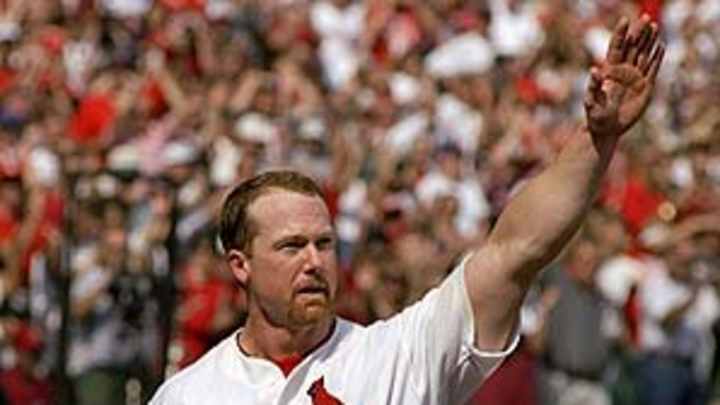After all these years, McGwire and La Russa still don't get it

Not only has Mark McGwire been in hiding for years, he was apparently locked in a time capsule. One that was sealed up before the last eight seasons of baseball or BALCO ever happened.
McGwire never got the memo that the American public understands steroids. That we've been beat over the head with facts and evidence for the past seven years. That we know what they do.
Make you stronger. Hit a ball farther. Pad your statistics.
What McGwire said on Monday in his carefully orchestrated, weepy coast-to-coast confessional sounds like something he scripted back in 2001 when he retired. An excuse that the public might have swallowed a decade ago. But not now.
It's a little stunning that after all these years of waiting, after all these years he had to prepare for this moment that McGwire -- and his chief apologist, Tony La Russa, -- botched the admission.
McGwire's stance is that he only took steroids for his health not for strength. That he firmly believes that he would have hit the same number of home runs without performance enhancing drugs. That he doesn't view his numbers as a product of cheating.
Oh please. It's 2010. We're not morons.
La Russa was no better. On his own media blitz Monday he kept saying things like "I know how hard he worked." That the A's ran "a legit program and that Mark was a good example of working his butt off and getting his strength gains as a product of hard work." That McGwire was "the poster child for how hard we worked." As though his audience doesn't now fully understand by this point just how McGwire was able to work so hard.
La Russa said he didn't know McGwire did steroids until Monday morning when McGwire called him. La Russa is supposed to be some kind of baseball genius yet he was in the dark on McGwire?
La Russa has been the king of the double standard, rushing from microphone to notebook for years defending McGwire from all charges, while denigrating others like Jose Canseco at every turn.
Their mutual, choreographed spin on the revelations didn't quite add up. McGwire said he took steroids to help him recover because his body was breaking down. But those of us who covered that Oakland A's team in the late 1980s and early '90s remember a different scenario.
McGwire was a durable player in his early years. He played 155 games in 1988, 143 in 1989, 156 in 1990. His body swelled, getting bigger and bigger -- while steroid rumors were being whispered about the entire team. And then McGwire's body started to break down.
So which came first: the steroids or the breakdowns? McGwire would like us to believe it was the health problems which led him down the wrong path. But for most of us watching, the enormous growth appeared to come first and was followed by chronic breakdowns, such as his battle with plantar fasciitis. Back then the standard observation was that McGwire's body had gotten too big for his vulnerable feet to handle.
McGwire wants us to believe that his unworldly numbers came only from his amazing hand-eye coordination and the incredible "strength of my mind." That steroids didn't help him. Of course they helped him. They helped him cash in for millions of dollars. To hold on to a job. To steal storied home run records.
Even if McGwire doesn't believe steroids helped him hit a baseball further, he still had an unfair advantage. Using steroids to recover in a game where everyone is fighting for a job is cheating.
By his own account, McGwire started taking drugs a little more than a year after Canada's Ben Johnson shamed his country and his sport at the 1988 Summer Olympics. So McGwire knew exactly what he was doing. Yet in an interview on MLB Network on Monday night he claimed to Bob Costas that when he first took them, "I never thought anything if it."
Unlike some steroid users, McGwire has friends in high places. La Russa said he thinks McGwire will "regain a lot of the stature that he had." Commissioner Bud Selig has already forgiven his sins.
"The so-called steroid era ... is clearly a thing of the past and Mark's admission today is another step in the right direction," Selig said in a statement.
Maybe if you say it often enough it's true. But as long as they keep printing Hall of Fame ballots, the steroid era is going to continue to live on.
Now McGwire is going to take one of the 30 jobs in baseball as a hitting coach. He's going to teach young players how to ply their trade. He's going to be a major influence -- like he was in the A's clubhouse on young players like Jason Giambi, who did everything Big Mac did
"It's unfortunate I played in this era," McGwire sniffled, as though he was a victim of circumstance.
In truth, McGwire defined the era. He became Exhibit A for how money, fame and hallowed records can be gained through chemistry.
We all learned a lot during McGwire's era. Including how to differentiate between an honest admission and continued denial.
